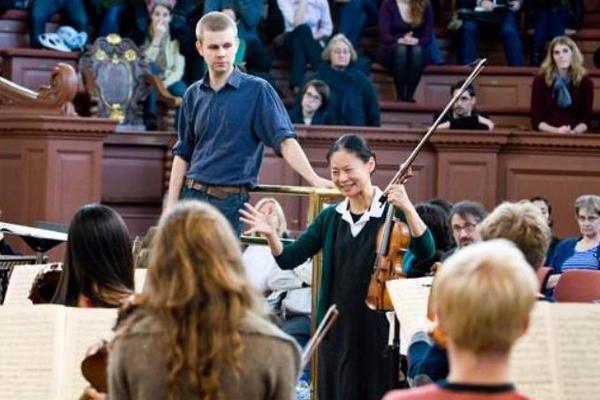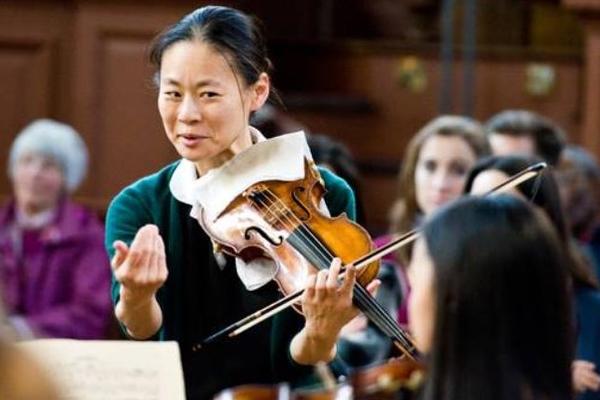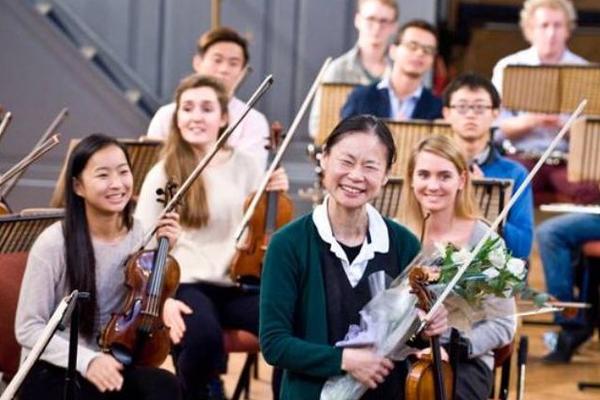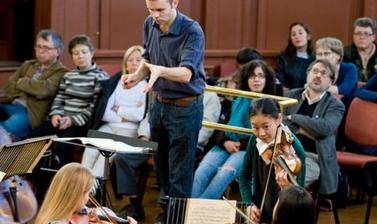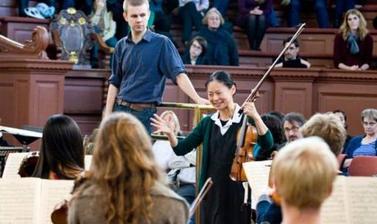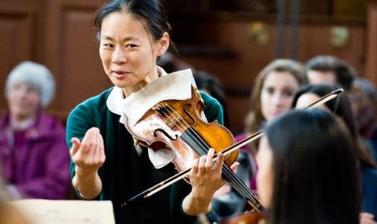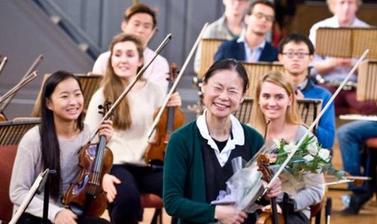Midori Open Rehearsal
Midori came to Oxford and did an open rehearsal with OUO as part of the TORCH Humanitas programme. Tom Nelson (horn) and Jasper Bittner (Cello) wrote reviews of their experience:
Amid a busy term of work, play and music-making, you would be forgiven for asking whether an extra three hour rehearsal on a Sunday afternoon is the best way to spend a weekend. On 27th October this Michaelmas Term, however, it certainly was, as OUO took part in an open rehearsal of Brahms’ violin concerto with the world-famous violinist Midori. Although it was not an easy afternoon for the brass section, who spent most of the day counting bars upon bars of rest, interspersed with pitching the occasional awkward interval, it was certainly a day which I learnt a lot from and below are just a few memories of the event.
At the very start of the rehearsal, Midori admitted (to a collective sigh of relief from the brass) that – as a string player herself - she would mainly be directing her comments and advice at the string sections. She also noted, however, that much of what she said would also be applicable to the wind and brass, which was certainly true. For besides a few strings-only comments (such as the warning about underestimating an interval between two low notes because of the extra distance it corresponds to on the finger board), most of her advice was relevant to all orchestral music-making. She was very keen to emphasise the need to listen to each other, both within each section and throughout the whole orchestra, and not just to listen either – but also to look and communicate. Part of this, she stressed, came through focusing energy and attention towards the middle of the orchestra, towards section leaders and the conductor. Other comments she made, meanwhile, are applicable to all kinds of music-making: you always need to keep in mind a sense of how long a phrase is and where you are within it, a tip as relevant to a concert pianist as to an orchestral second bassoon! When we came to face the numerous transitions within the individual movements of the concerto, Midori discussed the various types of changes in music: some are sudden and unexpected for an audience, others are gradual and gather increasing momentum as you go, and then there are others that you only realise should have been changes several bars later; although the first two are marked by a composer in the score, the last variety is the result of an inattentive orchestra with a lack of focus and should be avoided at all costs! Such advice as this might seem simple and common sense, but it is all too easily forgotten when dealing with exciting and large-scale repertoire, and it takes someone like Midori to point out the basics again, which will make such a difference to an ensemble’s cohesion and sound. Since the open rehearsal, I have definitely thought more about the fundamentals of music-making, and I’m sure many others in both the orchestra and the audience have similarly profited from the event.
After the hard-work of sight reading through the stop-start rehearsal, the afternoon reached a fitting climax as the orchestra and Midori played through the first two movements of the concerto from start to end. It was a special treat to finally hear Midori play through her cadenza, as the orchestra tried to put into practice the advice that she had given us during the rehearsal. To cap the afternoon, after the performance and the obligatory flower-giving there followed a question and answer session in which we learnt some insights into the personal and musical life of an internationally acclaimed violinist. It was especially interesting to hear how for Midori, practice is practically the only time which she gets to spend alone and focus on herself, and for that reason she finds it relaxing, especially now that she's older. For most in the orchestra, for whom practice is a gruelling necessity, this perspective was not only intriguing, but also a breath of fresh air. The event as a whole, therefore, was not only fun, but also instructive, and it was a great opportunity and privilege to play with such a renowned and talented musician. I myself certainly enjoyed and learnt much from the event and, based on what I heard afterwards from orchestra and audience members alike, this view was shared by many others.
All members of Oxford University Orchestra felt greatly honoured in Michaelmas-Term, when they enjoyed a unique opportunity to work with Midori on Brahm’s Violin Concerto. From October 25 to 28, Midori held the Humanitas Visiting Professorship at the University of Oxford. Along with a lecture on music education and her solo-recital of Bach’s solo partitas at St. John’s College, she had agreed to an open rehearsal with OUO in the Sheldonian Theatre.
Over the course of several hours, Midori managed to carefully dissect the first movement of Brahm’s Violin concerto and worked on small details just with the same enthusiasm with which she paid attention to the ensemble sound of OUO and the bigger picture. Presumably everyone in the orchestra will remember the first important lesson of that day: “We shouldn’t play any note without a substantial emotional investment.” Midori taught us all a lesson in mindfulness and being “awake” when approaching a piece of music. Playing an instrument, in her account, is first and foremost a state of mind, rather than a physical exercise or a simple enjoyment – to the extent that the players should think of themselves as of the instrument. No matter where we are, our music depends on how we align our senses, relate to external impulses and arrive at a feeling of being “there”. Being “there” in a big ensemble like an orchestra is, of course, of a different quality compared to the performance of a soloist. Thus we arrived at the second important lesson of that day, which quickly transcended the realm of simply rehearsing Brahm’s Violin Concerto: “Playing music together with others – be it chamber-music or in an orchestra – depends on a balance of giving and taking. Unfortunately, most humans are so much better in taking than giving.”
After the rehearsal of the first two movements of Brahm’s Violin Concerto, there was room for questions from both the orchestra and the audience. Judging from the turnout at the rehearsal and the many interesting questions this open rehearsal was gratefully appreciated from all kinds of classical music fans at Oxford University. OUO is looking forward to providing similar occasions with eminent musicians who come to visit the University in the future.




